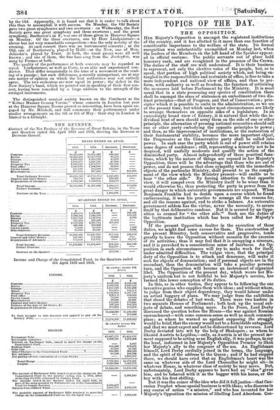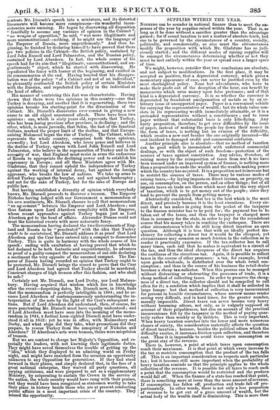TOPICS OF THE DAY.
THE OPPOSITION.
HER Majesty's Opposition is amongst the registered institutions of the country, and it has allotted to it more than one function of considerable importance to the welfare of the state. Its formal recognition was substantially exemplified on Monday last, when the leaders of the Members on the left hand of the Speaker appear- ed in official costume. The public servants out of place hold honorary rank, and are recognized in the presence of the Crown. The duties of the staff are well understood. It is their business to represent, not only the eleeMve votes of the people, but, so to speak, that portion of high political society which, not being en- tangled in the responsibilities and restraints of office, is free to take a more independent and national view of affairs, and thus to per- form, with authority as well as freedom, the function of criticizing the measures laid before Parliament by the Ministry. It is most usual that in a state possessing any species of constitution there shall be amongst the class of statesmen an embodiment of two dis- tinct principles-that of Progress, and that of Conservation ; prin- ciples which it is possible to unite in the administration, as we see at the present time but which under most circumstances are likely
to arrange themselves on opposite sides of a legislature. In an exceedingly broad view of history, it is natural that while the in- dividual bent of men should array them on the side of one or other principle, the alternation of pressing national necessities should call one or other party embodying the opposite principles to power ; and thus, as the improvement of institutions, or the restoration of their fundamental stability, becomes the more important object, the Progressive or the Conservative party shall be called into power. In such case the party which is out of power still retains some degree of confidence ; still, representing a minority not to be despised, will usefully moderate and qualify the action of the diminished party. Almost independently of 'these practical func- tions, which by the nature of things are reposed in her Majesty's Opposition, there will be the advantage that those who are out of power, and do not possess that close sympathy with the immediate objects of the particular Ministry, shall present to us the comple- ment of the view which the Mmistry present-will enable us to hear "the other side." By forcing attention to that opposite view, it will compel even the Ministry itself to be wiser than it would otherwise be; thus protecting the party in power from the great danger to which autocratic governments are exposed. When Benjamin Franklin had to decide upon a course which he found embarrassing, it was his practice to arrange all the reasons for, and all the reasons against, and to strike a balance. An autocratic government seldom has the virtue, never the necessity, to secure itself by that deliberative candour. But it is secured by an Oppo- sition as counsel for "the other side.'" Such are the duties of the legitimate institution which has been called her Majesty's Opposition. If the present Opposition fanner in the execution of these duties, we might find some excuse for them. The construction of the present Ministry, both conservative and progressive, tends greatly to leave the Opposition without occasion for the exercise of its activities; thus it may feel that it is occupying a sinecure,
and it is in to a conscientious sense of inertness. An Op- position n such circumstances will try to make work for itself, under admitted difficulties. The vulgar view, that the principal duty of the Opposition is to attack and denounce, will make it seek for objects of denunciation ; and if personal objects are in the ascendant, then the denunciation will take a peculiar personal turn, and the Opposition will become an instrument of organized libel. The Opposition of the present day, which wears her Ma- jesty's uniform but is not faithful to her Majesty's service, has formed this lower conception of its duties. In this, as in other tactics, they appear to be following the one inventive genius who supplies them with ideas ; and without whom, to judge from their abject dependency, they would labour under an actual beggary of plans. -We may judge from the exhibition that closed the debates of last week. There were two leaders in
two separate Houses of Parliament; both took up the usual sub- jects of debate, and something more. In the Peers, Lord Derby
discussed the question before the House-the war against Russian encroachment-with some common-sense as well as much common- place ; as where he warned us against supposing the struggle would be brief, that the enemy would not be a formidable antagonist,
and that we must expect and not be disheartened by reverses. Lord Derby deviated into wit by the help of Shakspere ; as where he
likened Austria to Lepidus,-only, as Austria is at the present RIO- ment supposed to be acting as an English ally, it was perhaps, to sity the least, indiscreet in her Majesty's Opposition Premier to liken
her Majesty's ally to the congener of the ass. An Englishnuai himself, Lord Derby cordially joined in the terms, the lan,guage, and the spirit of the address to the Queen ; and if he had stopped there, we should have cried that an Englishman's heart was the same on whatever side of the Lord Chancellor he might sit-in whatever House, in whatever class of society he may move. But,
unfortunately, Lord Derby appears to have had an "idea" given him, and he behaved with it as the beggar with his horse, or the boy with his first shilling.
But it was the coiner of the idea who did it full justice-that Cau- casian Prophet whose special business is with ideas; who discerns in any course of action "a mission," and who has invented for her Majesty's Opposition the mission of libelling Lord Aberdeen. Con-
eentrate Mr. Disraeli's speech into a miniature, and its distorted lineaments will become mere conspieuous—its wonderful incon- sistencies more amusing. He began by disavowing all disposition "fancifully to assume any variance of opinion in the Cabinet "; "no weapon of opposition he said, "was niore illegitimate and more unconstitutional—nothing, if he might use the language of the Emperor of Russia, more ungentlemanly." And thus be- ginning, he finished by declaring himself to have proved that there are two policies in the Cabinet—the British policy, sustained by Lord John Russell and Lord Palmerston, and the Russian policy, sustained by Lord Aberdeen. In fact, the whole course of his speech had for its aim that "illegitimate, unconstitutional, and un- gentlemanly" object, which he started with disavowing. He repudiated the fancy with horror at the beginning, and exulted in its consummation at the end. Having boasted that his disappro- bation was of the policy "of a Cabinet and not of an individual," he pleasantly contrasted the British policy of certain Ministers with the Russian, and reprobated the policy in the individual at the head of affairs.
His manner of contriving this feat was characteristic. Having shown that there were two opinions in this country—one that Turkey is decayin„,e. and another that it is regenerating, these two opinions became his starting-point for the divarication of the Cabinet. Mr. Disraeli's discoveries ever consist in giving a new name to an old object announced afresh. There have been two opinions : one, which is sixty years old, represents that Turkey, who has been losing province after province, is declining; and the other, which, is more juvenile, that Mira, the last of the fanatical Sultans, marked the proper limit of the decline, and that Europe- anizing Mahmoud began the rise of Turkey. The Cabinet, which represents the whole country, comprises both these opinions, avowedly ; but Lord Aberdeen, who loves peace and believes in the decline of Turkey, agrees with Lord John Russell and Lord Palmerston' who believe in the regeneration of Turkey and in the necessity of war, that England must resist in arms the endeavour of Russia to appropriate the declining power and to establish his supremacy in Europe; and all these Ministers agree with Mr. Gladstone, that they cannot uphold the independence of Turkey against the working of internal decay, but against the foreign aggressor, who breaks the law of nations. We take up arms to defend Turkey against the burglar, and not against bankruptcy ; and not for the sake of Turkey, but for the sake of Europe and public law.
But having established a diversity of opinion which everybody knows Mr. Disraeli proceeds to discover a treason. The Emperor Nicholas having lodged with our Government a memorandum of his own sentiments, Mr. Disraeli chooses to call that memorandum "an agreement" between the Emperor and Lord Aberdeen ; and thus fastens upon Lord Aberdeen complicity with the Emperor, Whose recent approaches against Turkey began just as Lord Aberdeen got to the head of affairs. Alexander Dumas could not treat the historical events with more autocratic fancy.
The memorandum having declared the two Governments of Eng- land and Russia to be "penetrated" with the idea that Turkey ought to be maintained, Mr. Disraeli adduces it as proof that Lord Aberdeen and the Czar have entered into a compact to dismember Turkey. This is quite in harmony with the whole course of his speech.: endino.b with exultation at having proved that which he had declared to be both fantastic and ungentlemanly, he advances as proof of a guilty compact the memorandum of one side declaring a sentiment the very opposite of the assumed compact. The Em- peror of Russia having recorded an opinion that Turkey ought to be protected, Mr. Disraeli brings the record to prove that the Czar and Lord Aberdeen had agreed that Turkey should be murdered. Construct charges of high treason after this fashion, and who shall be safe?
Certainly not Mr. Disraeli, nor Lord Derby, nor Lord Malmes- bury. Having acquired that -wisdom which lies in knowledge after the event—forgetting dates, Mr. Disraeli now, in 1854, finds that the memorandum is perfectly intelligible in 1844; and he ac- cuses Lord Aberdeen of contemporaneously nriderstanding the in- terpretation of the note by the light of the Czar's subsequent ac- tions. But if Lord Aberdeen did understand, then of course, far more penetrating Mr. Disraeli must.have equally understood ; and if Lord Aberdeen must have seen into the meaning of the memo- randum in 1844, t fortiori keen-sighted Disraeli must have under- stood it all in 1852: yet he was in office, with Malmesbury and Derby, and what steps did they take, what precautions did they prepare, to rescue Turkey from the conspiracy of Nicholas and Aberdeen? If Aberdeen's acts were treason, theirs were misprision of treason.
But we are content to charge her Majesty's Opposition, and es- pecially the leaders, with not knowing their legitimate duties.
ey might have saved themselves the trouble of getting up the "idea," which they displayed to an admiring world on Friday night, and might have snatched from the occasion an opportunity unknown to any Opposition for generations. If they had stood forward in their places, and simply declared that, in the face of a great national enterprise, they waived all party questions all carping criticisms, and were prepared to act as a supplementary Ministry, by cooperating to sustain the Crown in the service of the nation, the whole country would have rung with their praises, and they would have been recognized as statesmen worthy to take their place in history beside those who are at present conducting public affairs in a most important crisis of the country. They missed the opportunity.



























 Previous page
Previous page